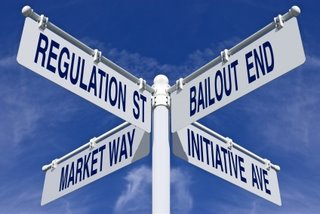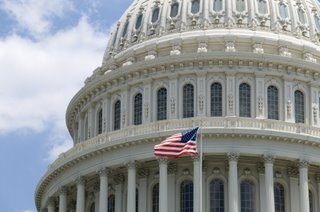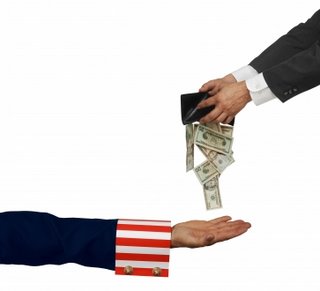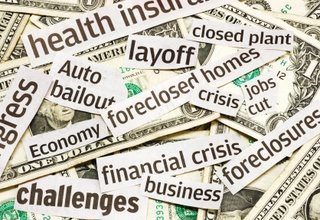February 6th, 2009

Credit card users were overjoyed and then deflated when, in December, Federal Regulators announced restrictions on deceptive and unfair practices used by the credit card industry.
While the new regulations addressed most of the worst practices used by card issuers, they weren’t set to go into effect until July 2010. That left plenty of time for card issuers to lower the boom on current credit card users.
When the regulations were passed, credit card companies asked for time to implement the new rules, and congress complied. Now, perhaps as a result of public outcry, a bill has been introduced to congress to speed up the process. If passed by both the Senate and the House, the bill will then go to the President. New regulations would take effect 90 days after receiving the President’s signature.
Among the measures covered by this legislation the bill will obligate credit providers to give customers 45 days’ notice for rate increases and would prohibit them from raising rates on current balances, unless the card holder payments are more than 30 days late.
It will also end the practice known as double-billing, which has been costly for consumers who carry a balance on their cards.
Card issuers will also be required to mail statements in a timely manner – so that card holders have time to receive the bill, pay it, and mail it back by the due date. Presently, the bill may be due the day after receipt – forcing card holders into a late-payment situation.
Representative Carole Maloney, who authored the bill, said “Congress should act immediately to stop them, not force consumers to wait another year and a half before they get relief.”
Meanwhile, credit card holders should watch their statements carefully – and open them the day they arrive. Check for due dates, interest rates, credit lines, and minimum payments. Don’t assume that things are the same as they were on the previous statement, because until this legislation becomes law, card issuers don’t have to give you fair warning.
In addition, be sure to read every correspondence from your card issuer, and if you plan to make a large purchase with your credit card, go to the website and check your available balance before leaving home. Just because you had $5,000 available on your most recent statement doesn’t mean it is still available.
CreditScoreQuick.com your resource for free credit reports, credit cards, loans, and free credit repair advice.
Posted in credit card regulation | Comments Off
February 6th, 2009
 While Washington is pinning its hopes for a revitalized economy on the spending habits of consumers, financial experts are advising a halt to discretionary spending, and Americans are heeding the advice. While Washington is pinning its hopes for a revitalized economy on the spending habits of consumers, financial experts are advising a halt to discretionary spending, and Americans are heeding the advice.
New reports show borrowing is down and savings are up – indicating the average American’s concern with being able to pay bills and maintain a good credit rating.
Many consumers are also taking advantage of free credit reports to keep a close watch on their FICO scores and to be immediately alerted to mistakes and signs of identity theft.
But there’s one decision conservative borrowers are making that could hurt even while it helps. That is the decision to move outstanding credit card balances from high interest cards to lower interest cards.
Consolidating balances in that way is smart in that it puts more dollars toward paying down debt and fewer dollars toward paying interest, but it could hurt FICO scores, and that could hurt in the long run.
Under the current FICO credit scoring system, your score will be better if your debt is spread out among all your available credit – so that you use no more than 30% of the credit available on any one card. In fact, some experts say you shouldn’t use more than 10%.
Even when your total debt remains the same, if it is concentrated in one card and that concentration brings your use of that card over 30%, your score will begin to fall. If you get up close to “maxing out” the card, your score will suffer even more – even if you have a zero balance on several other cards.
FICO is instituting a new scoring system this year, and this problem could be addressed, but we have read nothing to indicate that it will. So in the meantime, consider this move carefully, and take another step before you decide.
Before making any decision, contact your card issuers. Ask to have your interest and credit limits restored to their previous levels. If the first representative refuses to discuss it, hang up and call again. If you don’t get results, ask to speak with a supervisor.
If you’ve been a good customer – always paying on time – they should be willing to work with you. If they hesitate, let them know that you’ll be transferring your balance.
Your decision to consolidate will help you get out of debt faster, but it will lower your scores. So consider your plans for the coming months and decide if a temporary drop in credit scores will affect your life negatively. If not, then go for consolidation and get out of debt as fast as you can.
CreditScoreQuick.com your resource for free credit reports, credit cards, loans, and free credit repair advice.
Posted in consumer debt | Comments Off
February 5th, 2009
 While credit card companies are taking steps to reduce lending and are cutting credit limits on some of their best customers, it appears that they are still wooing students and encouraging them to create new credit card accounts. While credit card companies are taking steps to reduce lending and are cutting credit limits on some of their best customers, it appears that they are still wooing students and encouraging them to create new credit card accounts.
Some states have become so alarmed over the growing debt incurred by students that they are pushing legislation to crack down on card issuers targeting students.
Texas, California, New York and Oklahoma have already passed laws restricting or regulating the marketing of credit cards on college campuses.
In Illinois, pending legislation would ban free gifts with credit card offers on college campuses and prohibit the selling of student information from colleges to credit card lenders. It would also require financial literacy education for freshmen students at schools that allow credit card marketing.
Lawmakers are concerned that aggressive and often predatory practices by credit card companies are targeting students with little financial sophistication – and plunge them into debt that will be difficult to repay.
In 2008 the U.S. Public Interest research Group completed a study at 40 college campuses. They learned that 25% of students had paid a credit card late fee, 15% had paid an over-limit fee, and 6% had already had one or more credit cards cancelled for nonpayment. This event, of course, puts a 7-year black mark on the student’s credit report, making it difficult for them to obtain needed credit after graduation.
Along with offering free gifts for making application, some credit card issuers are promoting rewards cards geared specifically to youth. The rewards include travel, cash back on bookstore purchases, and merchandise rewards such as CD’s, videos, and movie tickets.
While this attempt at a crackdown is taking place, lawmakers are also taking notice of the need for financial literacy among younger students. Legislation is pending in various states to require financial education in high schools. In Virginia, it has been law since 2006.
The President’s Advisory council on Financial Literacy was created by President Bush in January 2008. As a result of testing conducted last year, it recommends requiring schools to teach financial education in grades K-12, and requiring college students to take a financial literacy course in order to receive federal student loans.
The Council also recommended tax incentives for employers who teach workers about money management, creation of a federal financial literacy website, and making a debit-card-accessible bank account available to every adult American.
The goal of these recommendations is a future generation and a current population armed with sound money management skills to make good decisions for themselves and their families.
Author:Marte Cliffe
Posted in Uncategorized | Comments Off
February 4th, 2009
 It’s about time that our government got involved with the excessive spending of Executives, after the US treasury bailed them out. In my opinion it is very distasteful that these executives are still living the lives they are after all the turmoil in our financial market. I still blame government for the deregulation, which is primarily the Republicans parties fault. They are the ones that pushed for deregulation, and guess what that did to our banking system? Well, by now you can figure that out just by watching TV or reading the local news paper. It’s about time that our government got involved with the excessive spending of Executives, after the US treasury bailed them out. In my opinion it is very distasteful that these executives are still living the lives they are after all the turmoil in our financial market. I still blame government for the deregulation, which is primarily the Republicans parties fault. They are the ones that pushed for deregulation, and guess what that did to our banking system? Well, by now you can figure that out just by watching TV or reading the local news paper.
Greed is mainly the problem, I don’t care where you graduated from and what your GPA was, no one is worth what these CEO’s and executives are getting paid. I am sure you have heard these big investment bankers saying they are concerned about scouting talent with the “new cap” on income for companies that the government bailed out. The cap will be $500,000 a year. Hmmmmmm I guess I could live on that, if I did not have a yaught, 3 mansions and a Ferrari.
I think our country needs a real wake up call; we are extremely spoiled and blessed at the same time. Being in lending I have learned that money brings out the worst in people. Where there is lots of money, there is lots of GREED.
Even though I did not vote for Obama, I am impressed with what he is doing. I believe he is in the right direction on some matters, especially when it comes to politics in Washington.
Credit has never been more important these days, and hopefully the American people will just be happy with what they have. You never know, “when what you currently have” “might end up being what you had.”
So with all of this being said, make sure you are saving your money, staying on top of your credit. This might even be a great opportunity to learn a new trade through your local college. As markets that are hot change over time, there will always be new hot ones. I would have to say the next hot market will be the web.
Just make sure once you make it to the top that you are not like the rest of greedy America, be very thankful for what you have.
CreditScoreQuick.com your resource for free credit reports, credit cards, loans, and free credit repair advice.
Posted in Uncategorized | Comments Off
January 30th, 2009
 Credit cards and debit cards are handy tools when you want to assure yourself of a room at your vacation destination, a best price on an airline ticket, or a car waiting for you when your flight touches down. Credit cards and debit cards are handy tools when you want to assure yourself of a room at your vacation destination, a best price on an airline ticket, or a car waiting for you when your flight touches down.
But before you whip out just any credit or debit card, be aware of what will happen next, and how it can affect both your cash flow and your credit scores.
When you book a room and give your credit or debit card number, most hotels will immediately check to see that you do have the credit or the funds. That’s reasonable, isn’t it? The next step may also be reasonable, but can be detrimental to you.
Because they want to be assured that they’ll be paid if they hold your room and you turn out to be a “no show,” they then place a “hold” on an amount equal to the expected charges for your stay. If you call and cancel within their specified time frame, they’ll release the money, but meanwhile, it’s as if you’ve already spent it.
Gas stations and rental car agencies use the same practice, and some car rental agencies check your actual credit report each time you rent a car – placing numerous credit score-damaging inquiries in your file.
So be careful. It makes sense to book a room early if you’re traveling to a popular destination, or if you have an opportunity to get a reduced rate on your room or your airline tickets, but choose a little-used credit card – one that you don’t use for day to day purchases. If possible, choose a card with a large credit line, so that your hotel reservation doesn’t use up more than 30% of your available credit.
If you use your debit card, get the exact amount that they’ll hold and write it into your check register as an amount already spent. Otherwise, you could be faced with returned checks, overdraft fees, and a bad stain on your credit report.
Reservation clerks will tell you not to worry – your card won’t be charged unless you fail to show up. Then you’ll have the option to use the card or pay by another means once you get there. And that’s true.
But in the eyes of your banking institution, your credit card issuers, and the credit bureaus who determine your FICO scores, a “hold” is as good as a charge. It reduces your available checking account balance, or reduces your available credit while raising the percentage of credit usage to credit available.
Posted in credit cards | Comments Off
January 29th, 2009
 There are some advantages of being self employed, you can write off quite a bit to avoid paying the IRS. You can also find yourself in trouble with the IRS because you were writing off items that may not have existed or just was flat wrong. I am sure if the IRS investigated every self employed individual, the American deficit would probably disappear due to back taxes being owed. There are some advantages of being self employed, you can write off quite a bit to avoid paying the IRS. You can also find yourself in trouble with the IRS because you were writing off items that may not have existed or just was flat wrong. I am sure if the IRS investigated every self employed individual, the American deficit would probably disappear due to back taxes being owed.
A couple of years ago getting loans for individuals that did not show much taxable income on there tax returns was not problem with decent credit scores. Well it is a problem now. It also is a federal crime to state on a mortgage application that you make more than you actually do. This is considered fraud, and was going on all over the United States with various mortgage bankers and brokers.
Currently no matter what your credit score is, you need to show income on your Schedule C tax return in order to qualify for a mortgage. There currently is no market for loans where qualifying income can not be documented. There are however hard money lenders willing to loan money to individuals like this, but those terms are close enough to being classified as loan sharking.
Let’s assume you do show some income on your tax returns, and typically lenders will require the last two years of tax returns for qualifying purposes. What a lender will do is average the last 24 months to determine your income. If you showed $20,000 one year in taxable income and $30,000 the next, your income would be $2083.00 per month. Regardless of whether you actually make $120,000 a year but your tax return shows $2083.00 per month, you will only qualify based on what is actually reported to the IRS.
So in my opinion those who actually make good money and cheat on there tax returns will ultimately cheat themselves out of a loan or qualifying for the mortgage they actually wanted. This applies to someone that has a $1,000,000 in the bank and a 820 fico score, rules are rules in banking.
So this year when you file your taxes and plan on making a home purchase I would re-consider how much you are writing off on your tax returns.
Posted in Uncategorized | Comments Off
January 20th, 2009

Credit card companies once vied for your business by trying to out-do each other in offering rewards. Now they’re responding to the worsening economy but cutting back on rewards programs.
American Express has dropped its offer of free domestic airline tickets to companions of Platinum and Centurion cardholders. In November, Chase cut its cash back rewards program from 3% of the purchase price to 1%. And Discover is now forcing cardholders to return their cash awards of they have a payment more than two months late.
Megan Bramlette, managing associate at the bank consulting company Auriemma Consulting Group, was quoted in USA Today as predicting more and more trimming of credit card benefits.
Some are seeing a drop in overall consumer debt as a good thing – it fell 3.4% in November alone – but this may not have been because Americans wanted to borrow less. It may have been a result of actions taken by the credit card companies:
• Increased interest rates
• Reduced credit limits
Those actions have a snowball effect on consumers. Not only is a smaller amount of their monthly payment going toward paying down principal, the reduced credit limits are reducing their FICO credit scores.
Many consumers wanting new credit cards, car loans, and mortgages are being turned down because their FICO scores no longer fall into acceptable limits – even if they were well above limits a few short months ago.
Credit card companies are running scared in the wake of the financial crisis, and they have come to the realization that many Americans are now broke. In response, some are opting to mitigate their losses by accepting payoffs of less than the original balance – some at 50% or less.
According to a recent report in the New York Times, Bank of America worked with over 700,000 consumers in 2008 – lowering interest charges, dropping fees, and sometimes reducing loan balances.
2009 will be a year of cutbacks and even hardships for many consumers – while presenting opportunities for others. As fewer are able to obtain mortgage loans, and more foreclosures come on the market, home prices should continue to decline. In addition, auto makers are offering loans with little to no interest, just to get those cars moving off the lots. Thus, consumers with high credit scores and money in the bank may be in a position to “choose their bargains.”
Even consumers with no interest in borrowing this year should be working to maintain high credit scores, because no one knows what the future will bring. So don’t wait until you need credit to see what your credit report says.
Not only are the rules changing, so that your score could have dropped without your knowledge, experts say that 25% of all credit reports contain errors that could damage your credit. Get your free credit report with scores today – just to be safe.
Posted in credit card | Comments Off
January 19th, 2009

Credit card issuers will have to adhere to some new rules by July 2010. That’s a step in the right direction, but could be too late for many consumers. In addition, the new regulations don’t address some of the issues that have angered credit card holders.
One of those issues is customer service. Cardholders are receiving notices in their statements, or in separate pieces of mail that are often mistaken for junk mail. These notices are hard to understand, so they’re calling customer service for help.
But… often the company reps can’t answer their questions. They don’t understand the notices either. Some will give an answer, and then if the consumer calls back, someone else will give a different answer. This is no help for the cardholders.
Consumer advocates are saying “Train your people!” This is especially important when those consumers are getting letters telling them they’re going to be paying more to pay off their debts.
Even more anger is generated by broken promises. Cardholders who have complied with the initial agreement they had with the card issuers are now getting notices that the agreement has changed. Their interest rates have been raised, they’re getting new fees, and their credit limits have been lowered.
This might be understandable if the consumer had been late with payments or had gone over limit. But these notices are also going to people who have held up their end of the bargain. Card issuers are changing the terms of the agreements with no provocation, after consumers are already in debt to them.
When interest rates escalate from 11% up to 19% – or even higher – more consumers have trouble making the monthly payment and of course are taking longer to pay down their debt.
Other consumers report that they had responded to offers urging them to transfer balances from higher rate cards, and would receive a 4.9% interest rate for the life of the transferred balance. They’ve been paying more than the minimum monthly payment, on time, every month. Now, while their interest rate has not been raised, they’re being slapped with a monthly service fee. Technically, it isn’t an increase in interest. But in practice, it is.
Credit card issuers say they are taking these steps to manage their own risk, but they knew when they went into the business of loaning money with no collateral that there would be risk involved. That doesn’t mean they should be able to change the rules after the game has begun.
Interestingly, these risk management moves may backfire. In addition to keeping people in debt longer, these credit card issuers are forcing some to default. Thus their worries about collecting the money owed are becoming reality.
According to the Federal Reserves’ most recent report on consumer credit, Americans have $976 billion in credit card debt, and the card issuers have been making billions in interest, annual fees, late fees, and over limit fees for years.
That makes it pretty difficult for credit card issuers to gain any sympathy from consumers struggling to pay off their credit cards.
Posted in credit cards | Comments Off
January 19th, 2009
The incidence of identity theft is keeping pace with the credit crisis – as more people’s credit scores shrink, more thieves come out of the woodwork.
Why? Because people whose credit is shot still want to buy things. The dishonest ones have found an easy route to accomplish that – they’ll just use your good credit.
If you learn that you’re a victim, here’s a step by step plan to get your credit back on track and erase the effects of theft.
1. If you get notice from a collection agency, first check to make sure that the agency is on the up and up. Bogus collection notices are a phishing scheme – designed to steal your identity or take money under false pretenses. Google the agency, then call the Better Business Bureau.
2. Contact your local law enforcement and report the theft. Get a case number.
3. Contact the FTC at www.ftc.gov and get the form to fill out. You’ll need to get this notarized. Follow the FTC instructions.
4. Call the FTC ID theft hotline: 1-877-438-4336 to register your name on the national list of victims. Record your reference number.
5. Contact the fraud unit at the collection agency and register a dispute. FAX them a copy of the FTC form and the police report.
6. Contact the credit card issuer or bank involved in the discovered theft. FAX them the documentation. Get your account numbers changed to prevent further use.
7. Contact one of the major credit bureaus to put a fraud alert on your account. The one you contact will pass the information on to the others.
Equifax: 800-525-6285
TransUnion: 800-680-7289
Experian: 888-397-3742
8. Consider putting a freeze on your credit report so that it cannot be accessed without your permission. Reading your report is one way that identity thieves choose their victims. After all, there’s no sense stealing someone’s identity if their credit is no better than your own! They want the “excellent credit identities!”
Note that stealing your actual accounts is not the only method of stealing your identity in use today. Now some thieves are merely stealing your information to print on bogus checks – many of which are not even tied to an actual checking account. It comes back on you because your name and information is printed on the check. The checks are passed using fake ID.
CreditScoreQuick.com
Posted in Uncategorized | Comments Off
January 15th, 2009

The Federal Government may be counting on Middle America’s spending to shore up the economy, but it appears that most Americans are not heeding the call. This is a time when we’re saying “Let somebody else do it.”
Americans who have seen friends and family suffer economic devastation due to job loss or illness are finally realizing that it could happen to them. As a result, we’re making major changes – including cutting non-essential purchases and making regular deposits to savings accounts.
In the past few months, we’ve begun paying down debt and putting money aside for a rainy day. In a recent poll, Visa asked more than 1,000 people about their savings intentions and learned that 30 percent are actively saving for a rainy day. Others are saving for retirement (20%), for education (10%) or to purchase a home (8%). While some of these figures may overlap, that indicates that over half of us are now actively saving.
At the same time, some are simply bailing out, opting to take Bankruptcy to get a fresh start. Bankruptcy rates increased by a third from 2007 to 2008 – with 1.06 million consumers filing in 2008.
The most common reasons given for the decision to take bankruptcy are job loss, divorce, unexpected expenses, and significantly overextended credit. For many, there’s no ladder tall enough to help them see over the top.
Some have ended up in this position as a direct result of the risky mortgages they were sold. When the rates adjusted, they were unable to make the payments, so began drawing money from credit cards while putting those houses up for sale. They hoped to get out from under with their credit still intact. Unfortunately, prices began dropping at the same time, so many found that their homes were no longer worth the balance due.
Some attempted short sales – but often it was too little, too late. New plans in place will hope to streamline the process, but until now it could take 8-10 weeks to get approval for a short sale – during which time the foreclosure would have been final or the buyer gone.
Two Bankruptcy options are available:
• Chapter 7, which completely removes all unsecured debt and keeps secured debt.
• Chapter 13, which is a reorganization plan for people with little unsecured debt. Under this plan, participants agree to a repayment plan over 3 to 5 years.
The good news for those filing bankruptcy who want to keep their homes is that Judges will now be able to reduce the balance due – bringing it down to the fair market value of the home.
CreditScoreQuick.com
Posted in economics | Comments Off
Disclaimer: This information has been compiled and provided by CreditScoreQuick.com as an informational service to the public. While our goal is to provide information that will help consumers to manage their credit and debt, this information should not be considered legal advice. Such advice must be specific to the various circumstances of each person's situation, and the general information provided on these pages should not be used as a substitute for the advice of competent legal counsel.

|












